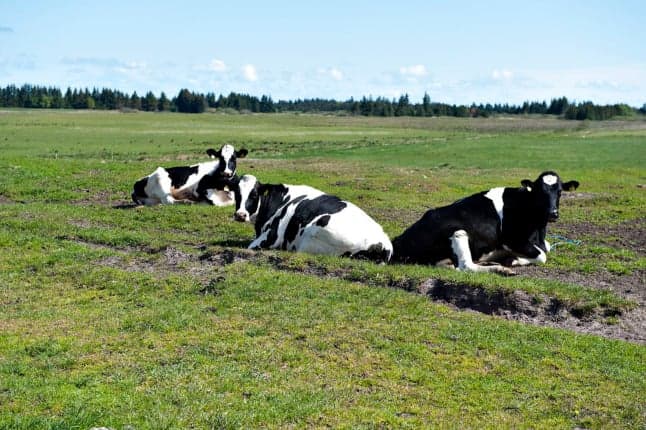Cattle near Danish city drank polluted water 'for years'

Increased concentrations of the pollutant substance PFOS have been detected in Odense Municipality on a field where cattle – used to produce meat for human consumption – grazed for a number of years.
The pollutant substance PFOS was detected in drainage and on a field where cattle have grazed for up to 25 years, local media on Funen report.
A large number of locations in Denmark are currently undergoing tests for the substance after a large amount of it was detected near the town of Korsør and subsequently in over 100 local residents.
Those tests have focused primarily on locations close to existing and former fire stations.
PFOS can cause various health problems if ingested by humans. Banned in 2011, it was earlier used in several products as well as for foam in fire extinguishers.
READ ALSO: PFOS: What you need to know about substance and pollution in Denmark
In Odense, it was detected from samples taken in June at the village of Seden north of the city.
Analyses of the water found concentrations of PFOS at 30 and 36 nanograms per litre, above the safety level of 0.65 nanograms per litre.
The quantity of PFOS detected in Odense is significantly lower than that found in Korsør, however, where it was measured to be 5,400 times higher than the permitted amount.
Concentrations found in soil in Odense were 27 times lower than in Korsør and samples from water were 1,000 times lower.
Phillippe Grandjean, professor in environmental medicine at the University of Southern Denmark, told TV2 Fyn that, as such, the detections in the two locations are not equivalent.
“It’s correct that the concentration is low seen in relation to the Korsør case, so there’s no immediate reason to be scared. But it’s difficult to say whether the tests are representative of how much PFOS is actually found in the area. It’s a momentary image of what is found in 2021 in those specific places,” Grandjean told the broadcaster.
The expert called for more tests to give a more thorough understanding of the situation and to investigate whether PFOS levels in soil or water may have been higher at other times.
Cattle have grazed at the area in question for 25 years. Of eight animals which currently graze at the location, meat from three will be tested for PFOS at the request of the Danish Veterinary and Food Administration (Fødevarestyrelsen). Sale of meat from the animals is suspended until results are available.
Odense Municipality believes pollution of the site to have originated in a nearby industrial area.
Comments
See Also
The pollutant substance PFOS was detected in drainage and on a field where cattle have grazed for up to 25 years, local media on Funen report.
A large number of locations in Denmark are currently undergoing tests for the substance after a large amount of it was detected near the town of Korsør and subsequently in over 100 local residents.
Those tests have focused primarily on locations close to existing and former fire stations.
PFOS can cause various health problems if ingested by humans. Banned in 2011, it was earlier used in several products as well as for foam in fire extinguishers.
READ ALSO: PFOS: What you need to know about substance and pollution in Denmark
In Odense, it was detected from samples taken in June at the village of Seden north of the city.
Analyses of the water found concentrations of PFOS at 30 and 36 nanograms per litre, above the safety level of 0.65 nanograms per litre.
The quantity of PFOS detected in Odense is significantly lower than that found in Korsør, however, where it was measured to be 5,400 times higher than the permitted amount.
Concentrations found in soil in Odense were 27 times lower than in Korsør and samples from water were 1,000 times lower.
Phillippe Grandjean, professor in environmental medicine at the University of Southern Denmark, told TV2 Fyn that, as such, the detections in the two locations are not equivalent.
“It’s correct that the concentration is low seen in relation to the Korsør case, so there’s no immediate reason to be scared. But it’s difficult to say whether the tests are representative of how much PFOS is actually found in the area. It’s a momentary image of what is found in 2021 in those specific places,” Grandjean told the broadcaster.
The expert called for more tests to give a more thorough understanding of the situation and to investigate whether PFOS levels in soil or water may have been higher at other times.
Cattle have grazed at the area in question for 25 years. Of eight animals which currently graze at the location, meat from three will be tested for PFOS at the request of the Danish Veterinary and Food Administration (Fødevarestyrelsen). Sale of meat from the animals is suspended until results are available.
Odense Municipality believes pollution of the site to have originated in a nearby industrial area.
Join the conversation in our comments section below. Share your own views and experience and if you have a question or suggestion for our journalists then email us at [email protected].
Please keep comments civil, constructive and on topic – and make sure to read our terms of use before getting involved.
Please log in here to leave a comment.